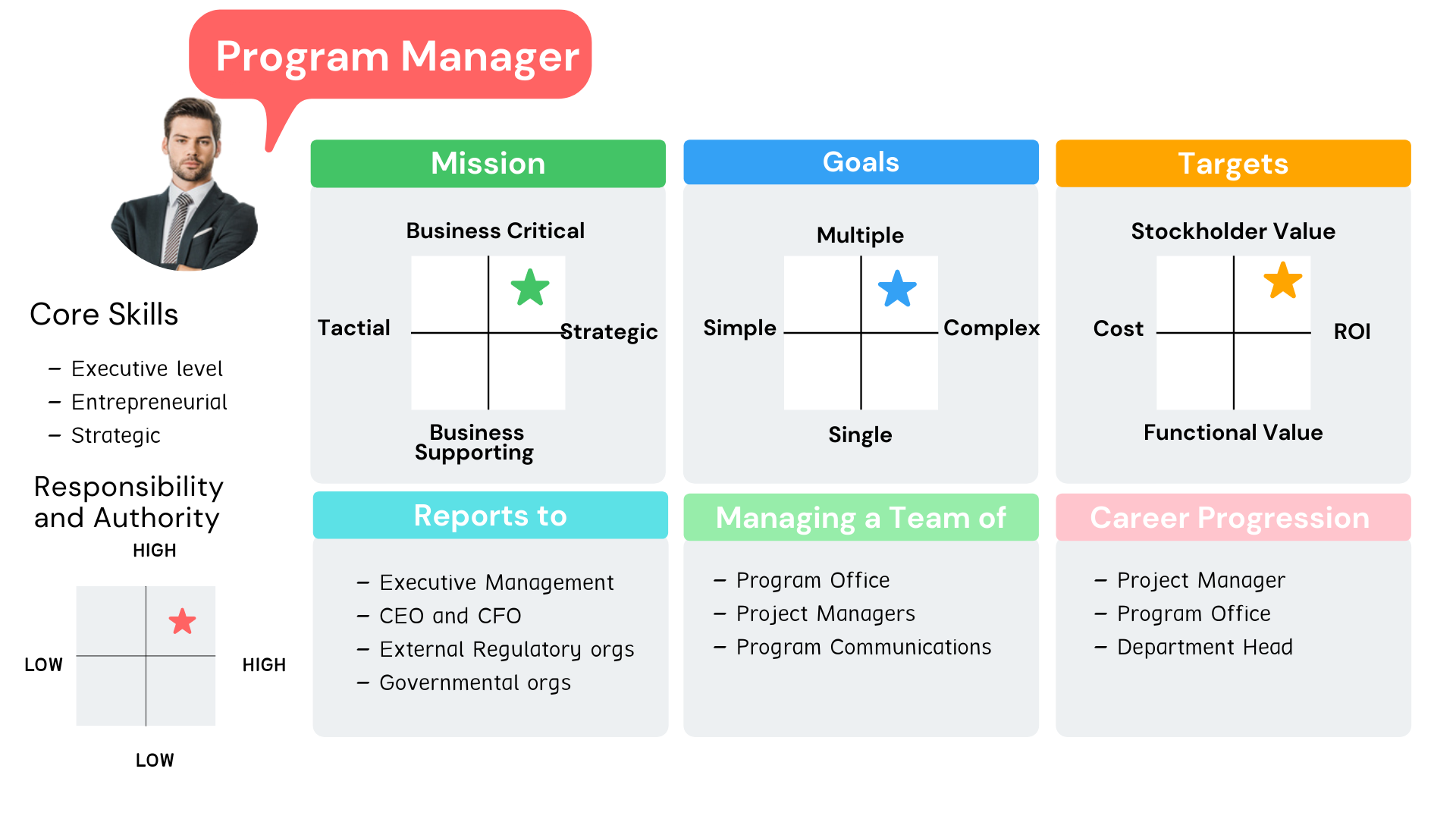Program Manager vs Project Manager: What’s the difference?
Do you think that Program Managers and Project Managers essentially do the same work? Yes and No. I break down the differences and and show you how focus, targets, skills and salary make these separate roles with separate goals.
Get the details to help you understand the work, the responsibilities and the pay off. Information that will help you be ready for your next job.
What are the differences?
Focus
Skills
Certifications & Education
Salary
Career Path
and more
The Program Manager and Project Manager are essentially responsible for a team, work, and outcome. They both deliver business value using organizational resources. But the differences are huge in terms of complexity, scope, and results. Another big difference is what is at stake for the organizations they work for.
What is a Program and Program Manager?
Let’s Start with Definitions before we get into the topic.
A Program is a set of related strategic related activities with a particular long-term aim.
A Program Manager oversees a long-term set of business objectives run as part of the corporate strategy. The Program Manager oversees the:
Program Mission overall
Realization of the Program related Return on Investment (ROI)
Corporate Communications and Politics needed to deliver the Program
What does a Program Manager do?
Program Managers work on long-term activities to deliver an outcome significant to the business organization. Senior Program Managers often work on high risk, high reward work, which is a corporate strategic initiative.
Focus
They are focused on the big picture. Others in their team handle details. Because of this, they tend to focus on:
Program Leadership - getting the right people in key roles
Program Projects - aligning the key projects to ensure integration on implementation
Program Optics - creating the right information flow to keep the Program running smoothly in and outside of the Program.
The Program Manager monitors a variety of Targets related to the aspect of the Program Results (ROI, Investment, and Stock value).
They may need to focus on the customer or public sentiment indicators.
Skills
Program Managers are generally Executive Level roles that require not only Project Management skills but also:
Business Skills to understand the Return on Investment
Stockholder Returns from the Program
Strategic Skills to define the Program Direction
A Program Manager is required to have Political skills to:
Ensure the Program has the right sponsorship with the organization
Communication skills to address Corporate Governance
Negotiation skills to ensure the Program has the needed resources to succeed
In some cases, Program Managers also needs specialized knowledge to address:
External Regulatory Agency processes and requirements
Governmental policies and protocols
External Public Relations skills to market the Program to the public or others
Certifications
Program Managers often will have a widely recognized Project Management Certification (such as PMI, PMP, ScrumMaster, or the like). In addition, they may have a higher level of Project certifications such as the IPMA Level A or B.
For certain Programs, they may need additional certifications to oversee the work (examples of this may be engineering or regulatory requirements.)
A Program Manager may have a higher academic degree (as an example and MBA or Ph.D. if the work is scientific or technical).
Click here to learn more about Project Certifications.
Reporting Lines
Program Managers report upward to Senior Managers. Since their work is often critical to long or short-term business results, they are held accountable to several levels of management.
They may have lateral reporting lines to departments that will take ownership of some aspect of the Program in the future to ensure good alignment and communication.
Program Managers will have direct reports from the Program related to Operational Management and the Projects or Project Groups that are key to the Program objectives. This is generally a limited number of people to allow the Program Manager to focus on the tasks noted above.
Career path
Program Managers often had prior roles as a Project Manager, worked as a Departement Head of an affiliated area, or worked in a Program Office, and they may have managed a smaller Program and taken on progressively more complex assignments during their career.
Data source: Zippia.com
Salary
Program Managers are paid more than Project Managers due to the complexity and experience required for these roles. They may have less detailed knowledge but have a wider breadth of skills and capabilities. Salary is also impacted by:
Years of experience
Delivery Track Record
Specialized skills
Education
Certifications
Because of this, the salary range may actually be much wider than shown in the graphic above. Salaries can also include base, bonus, and stock options commensurate with the business impact of the Program outcomes.
Program Managers and Project Managers work together to deliver value to their organizations.
What is a Project and Project Manager?
A Project is an individual set of activities with a specific and clear aim.
A Project Manager oversees a short-term set of tasks to achieve a single goal. The Project Manager oversees the:
Projects Charter and Plan
Staffing and Team allocation
Delivery of the final outcome (product, process, or service)
What does a Project Manager do?
Project Managers work on short-term activities to deliver an focused outcome to the support specific outcome business outcome. Project Managers need to focus on Delivery of the right Scope, Time, and Quality. A key leadership skill is supporting and coaching their Project Teams.
Focus
Project Managers are generally focused on time and scope-limited work. And while these projects are important, they often lack the complexity, corporate impact, and associated external-facing specialized skills needed by Program Managers.
Project Managers are focused on the management of their projects and project teams. They work to balance Scope, Quality, and Timelines constraints. The Project Manager focuses on the Key Performance Indicators to track these and other aspects of their team's work. These Managers are focused on the details of Project execution. Because of this, they tend to focus on:
Project Leadership - getting the right skills where they are needed most
Project issue Management - resolving issues and addressing project roadblocks
Project Deliverables - ensuring the milestones are met and the final product is delivered to agreed specifications.
Skills
Project Managers are generally Management level roles that require solid Project execution skills :
Project methodologies
Project processes
Project team dynamics
Delivery control and monitoring
Project Communications
A Project Manager may also have skills in the area of:
Specialize business processes
Product specialization
Implementation and Roll-out
Use adoption
Certifications
Project Managers can get certified in areas specific to their specializations and project implementation focus.
AQS Quality methods for engineers and other professionals
Google Certifications for IT projects
PMI Professional Project Manager methodology for general projects
Scrum Alliance for Agile projects
Again, click here to get more information on certifications.
Reporting Lines
Project Managers report upward to Sponsors and Project Steering Committees. They are sometimes working with User Groups to ensure product adoption.
They may have lateral reporting lines to the post-go-live operations departments.
Program Manager' direct reports include their Team Leads for Process Analysts, Technology teams, and the Project Office, including Finance Support and Communications. Get more information on Project team roles here: https://projectskillsmentor.com/project-skills/team-roles
Career path
Project Managers often come to the ranks of Project Management team members. They may also come from the operations organization that takes over the post-implementation support. Either way, working in and around project activities is a great way to grow Project Management breadth and depth.
Mentorship and Coaching skills are imperative for current Project Managers to build the future generation of Project Managers. Learn more about the power of coaching and mentoring here.
Data source: Zippia.com
Salary
Project Managers can have a wide salary range based on their work experience, key capabilities, project responsibilities, and the importance of the project outcome.
Project Managers may be paid less than Project Managers overall, but individual Project Managers can make much due to the above factors. Depending on the situation, Project Managers may be paid hourly, daily, a fixed price. Or based on a scale related to the project metrics. Salary is also impacted by the same things that impact a Program Managers salary:
Years of experience
Delivery Track Record
Specialized skills
Education
Certifications
Both Program and Project Roles Manage Targets or KPI’s
The Difference is in the details: Business Targets vs Project KPI’s.
So, Which is better: Program Manager or Project Manager?
Which Role is Better? Which one to choose?
Start where you are and do the work you like. And, remember, a Project Manager can take on Program work in the future. And likewise, a Program Manager may choose to lead a Project to grow or deepen their skills in new areas.
Program Manager in Review
Since Program Managers often manage Project Managers, they may be seen as the better role. But it really depends.
Managing a Program often dictates more time spent on office and external politics. Managing communication of a diverse group of stakeholders. This includes addressing issues completely out of your control.
The upside for a Program Manager is the scope of work, the variety, and the ability for upward mobility into other areas of Senior Management.
Project Manager in Review
Project work allows a manager to focus their skillset and become really well known for a specific kind of project. This allows the project manager to work in the flow and realize a level of expertise that the Program Manager will not often have.
Projects, however, often dictate long hours around milestones and go-live dates. And as any good project manager will tell you, the job of the Project manager is to be there with the team on those key moments.
The upside is that the team and Project Manager work closely together so that the Manager has a chance to engage the team in coaching and mentorship. The growth of team members can be one of the most rewarding aspects of project management.
So what do you think? Which job sounds good to you? If you have done both jobs, please share your experience of how they were different or similar for you.









